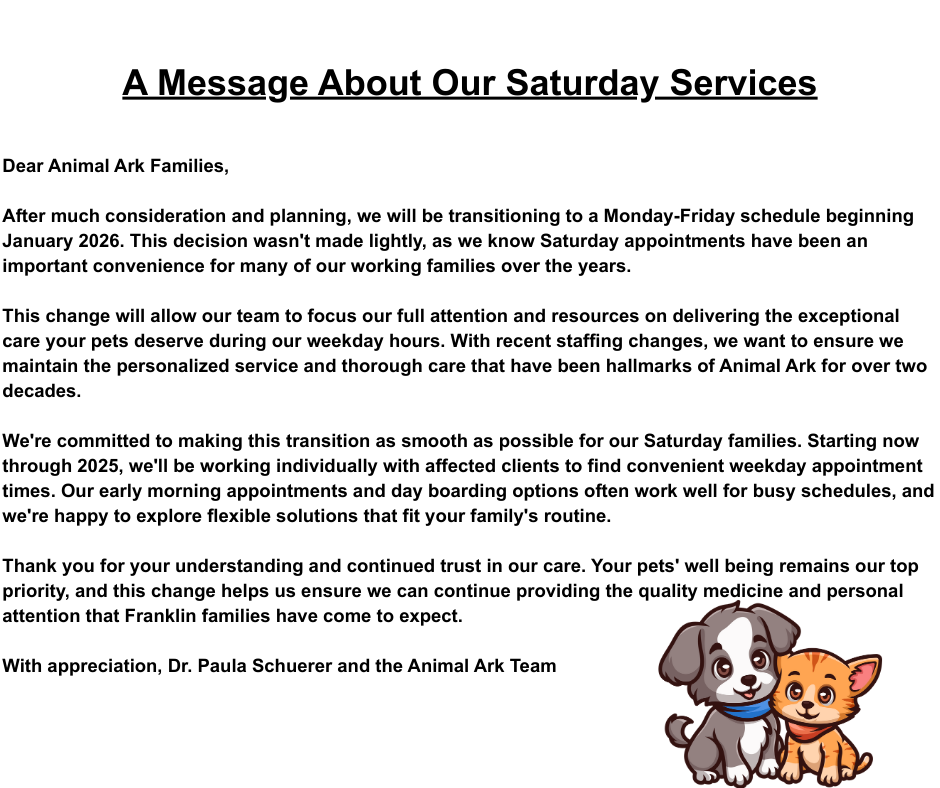Every dog owner has had to deal with a bit of drool now and then, but what happens when your beloved canine companion seems to be producing too much saliva? Understanding the reasons behind excessive drooling, or hypersalivation, can help pet owners identify potential health issues early on and take appropriate action. For professional guidance on your dog’s drooling concerns, contact Animal Ark Animal Hospital at (615) 778-0880.
Normal vs. Excessive Drooling
Not all drooling is cause for concern. Certain breeds like the Saint Bernard and Bulldog naturally produce more saliva due to their unique jaw and mouth structure. However, if you notice your pet drooling more than usual, it may be a sign of a more serious issue that requires veterinary attention.
Causes of Excessive Drooling in Dogs
Dental Issues
One of the most common reasons dogs drool excessively is dental problems. This can range from gingivitis and periodontal disease to oral tumors and dental abscesses. Symptoms can include foul-smelling breath, difficulty eating, or blood in the saliva. Regular dental care and professional cleanings can help prevent many of these issues.
Foreign Objects
Sometimes, your dog might get something stuck in their mouth or throat, such as a piece of bone, stick, or toy. This often causes discomfort, leading to excessive drooling. If you suspect a foreign object is lodged in your dog’s mouth, contact your veterinarian immediately rather than attempting removal yourself.
Heatstroke
Dogs cannot sweat like humans; they cool themselves down primarily by panting. If a dog is overheated and cannot effectively cool itself down, it may start to drool excessively. This can be a sign of dangerous overheating that requires immediate attention.
Nausea or Motion Sickness
Just like humans, dogs can experience motion sickness during car rides, or feel nauseous due to a variety of health conditions. This often leads to excessive drooling as a symptom, along with other signs of discomfort.
What to Do If Your Dog is Drooling Excessively
If your dog is drooling more than usual and it’s not related to their breed or normal behavior, it’s important to consult a veterinary professional. Here are some steps you can take:
Examine Your Dog’s Mouth
The first step is to gently examine your dog’s mouth for any foreign objects, swollen gums, or other visible signs of discomfort. If it’s safe and your dog allows, try to remove any foreign objects that might be causing the drooling. However, exercise extreme caution and never force removal if the object appears lodged.
Keep Your Dog Cool
If the weather is hot and your dog seems to be overheating, help them cool down immediately. Provide fresh water and bring them indoors or to a shaded area. You can also apply cool (not cold) water to their paw pads and belly to help regulate their temperature.
Consult a Veterinarian
If you cannot identify the cause of the excessive drooling, or if your dog shows other signs of distress like loss of appetite or unusual behavior, it’s time to consult a veterinarian. At Animal Ark Animal Hospital in Franklin, our team of veterinary professionals is ready to help diagnose and treat the underlying cause of your dog’s excessive drooling.
Early Detection is Key
As with many pet health issues, early detection can make a significant difference in your dog’s recovery and ongoing well-being. Regular check-ups are crucial for spotting signs of dental issues or other potential causes of excessive drooling. Our state-of-the-art facility at Animal Ark Animal Hospital is equipped to handle a wide range of pet health concerns.
Professional Care for Your Dog’s Health
While a little drool from your dog might be a perfectly normal part of your day, excessive drooling can be a sign of underlying health issues. Understanding why this happens and knowing when to seek veterinary care can help keep your dog healthy and happy. Don’t wait until your pet’s drooling becomes a larger problem—contact Animal Ark Animal Hospital at (615) 778-0880 or request an appointment if you have concerns about your dog’s drooling or any other health issues.

